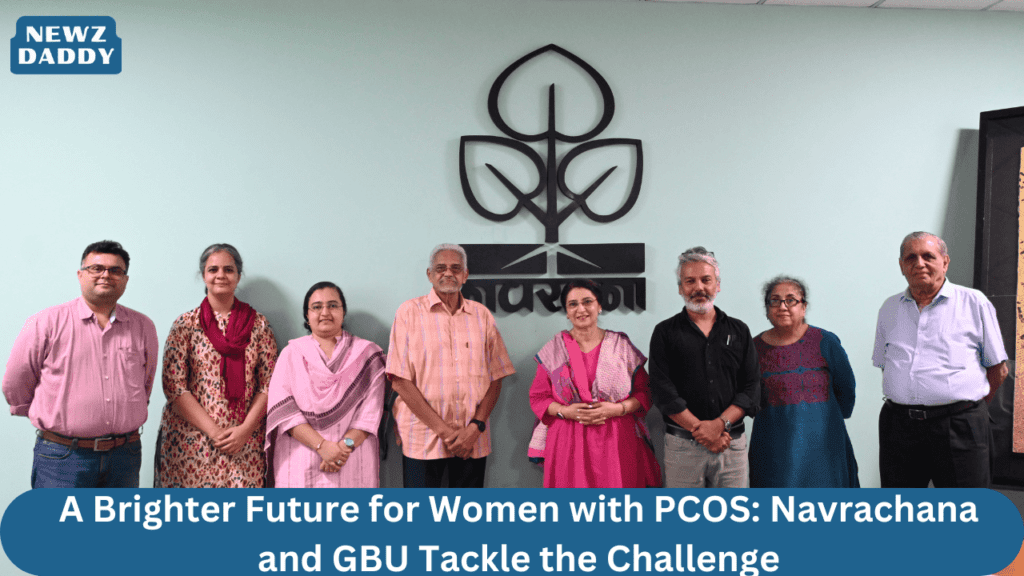A Brighter Future for Women with PCOS: Navrachana and GBU Tackle the Challenge
Newz Daddy Healthcare Updates
Synopsis
- Navrachana University receives a grant of Rs 83,20,640 for groundbreaking research on PCOS.
- Department of Biotechnology (DBT) sanctions the project focusing on the impact of β-glucan-induced gut microbiome metabolites on PCOS symptoms.
- The research is a collaborative effort between Navrachana University and Gujarat Biotechnology University.
- Dr. Darshee Baxi and Dr. Tejal K. Gajaria led the project from Navrachana University.
- Dr. Ravindra Pal Singh and Dr. Surya Ramachandran lead from Gujarat Biotechnology University.
- The study will focus on whether gut microbiome modulation can improve PCOS management through dietary interventions.
- The project will explore the relationship between gut microbiota, gut barrier, and β-glucan, aiming to develop accessible therapeutic approaches for PCOS.
- The study will run for three years, leveraging interdisciplinary expertise to address PCOS-related challenges like infertility and metabolic complications.
Navrachana University Secures Major Grant for Innovative PCOS Research
Navrachana University has recently received a remarkable grant of Rs 83,20,640 from the Department of Biotechnology (DBT). This significant funding will support a pioneering research project aimed at investigating the role of gut microbiome metabolites in improving symptoms of Polycystic Ovary Syndrome (PCOS). The project, titled “Can β-glucan-induced gut microbiome metabolites improve PCOS symptoms? An experimental and clinical study”, is part of the DBT Biomedical Task Force initiative and will be conducted over a span of three years.
Addressing the Complex Nature of PCOS
PCOS is a common but complex condition affecting millions of women worldwide, often leading to infertility, hormonal imbalances, and metabolic disorders. Despite its prevalence, there is no definitive cure for PCOS, making research into potential treatments critical. This project will focus on how β-glucan, a type of dietary fibre found in foods like oats and barley, influences the gut microbiome and whether it can help alleviate PCOS symptoms.
A Collaborative Effort for Groundbreaking Research
The research is a collaborative effort between Navrachana University and Gujarat Biotechnology University (GBU). Leading the project are Dr. Darshee Baxi and Dr. Tejal K. Gajaria from the Department of Biomedical and Life Sciences, School of Science at Navrachana University, while Dr. Ravindra Pal Singh and Dr. Surya Ramachandran from GBU will also play pivotal roles in the research.
The project reflects the power of collaboration between institutions with complementary expertise. Dr. Darshee Baxi, the Principal Investigator from Navrachana University, explains, “This research is crucial because it targets the root cause of PCOS rather than just managing the symptoms. By focusing on the gut microbiome, we hope to develop solutions that not only address the symptoms but could potentially provide long-term relief.”
The Role of Gut Microbiome in PCOS
Recent scientific advancements have shed light on the profound impact that the gut microbiome has on various health conditions, including metabolic disorders like PCOS. The gut microbiome refers to the trillions of microorganisms living in our digestive system, which play an essential role in digestion, immune function, and overall health. There is growing evidence that disturbances in the gut microbiota may contribute to the hormonal imbalances and metabolic issues associated with PCOS.
This project aims to explore whether β-glucan, which is known for its ability to boost the immune system and support gut health, can positively influence the gut microbiome and, in turn, improve PCOS symptoms. Dr. Tejal K. Gajaria, Co-investigator, adds, “The perspective of gut-microbiome modulation for unravelling molecular cross-talk among the gut-barrier, gut microbiota, and β-glucan might pave the way for managing PCOS through dietary interventions.”
Focus on Experimental and Clinical Studies
The project will be divided into experimental and clinical studies, ensuring a thorough investigation into the potential therapeutic effects of β-glucan on PCOS. The experimental phase will focus on how β-glucan impacts the gut microbiota at the molecular level. In contrast, the clinical phase will involve trials with women suffering from PCOS to observe the real-world effects of dietary interventions based on gut microbiome modulation.
By leveraging these dual approaches, the research team hopes to uncover specific metabolites produced by the gut microbiota in response to β-glucan consumption. These metabolites could potentially lead to a reduction in PCOS symptoms such as insulin resistance, hormonal imbalances, and chronic inflammation, which are often at the core of the condition.
Potential Impact and Future Applications
One of the most exciting aspects of this project is its potential for widespread therapeutic applications. If successful, the research could lead to the development of accessible, non-invasive treatments for PCOS, offering hope to millions of women who struggle with the condition. The findings may also influence future dietary guidelines and interventions aimed at improving metabolic and reproductive health in women with PCOS.
Prof. A. V. Ramachandran, Mentor at the School of Science, Navrachana University, emphasizes the importance of this interdisciplinary research, saying, “The collaboration between Navrachana University and Gujarat Biotechnology University exemplifies the power of interdisciplinary partnerships in addressing significant health challenges. The expertise of the investigators from both institutions will drive advancements in understanding and treating PCOS.”
A Bright Future for Women’s Health
The project represents a significant step forward in the understanding and treatment of PCOS. By combining cutting-edge research with a focus on practical, dietary-based solutions, the research team hopes to make meaningful contributions to women’s health. The ultimate goal is to develop sustainable and accessible therapies that can improve the quality of life for women affected by PCOS.
With the generous support of the DBT Biomedical Task Force, Navrachana University and Gujarat Biotechnology University are poised to make groundbreaking strides in the field of women’s reproductive health. Over the next three years, this project will explore the untapped potential of the gut microbiome in managing complex conditions like PCOS, bringing us closer to new solutions for this widespread and challenging condition.
This human-centred article highlights the scientific depth of the research while maintaining an easy-to-understand, friendly tone.

